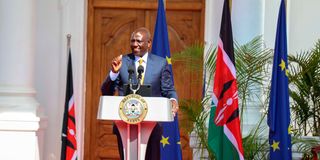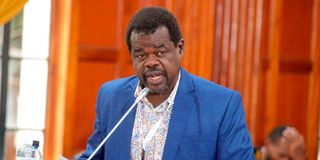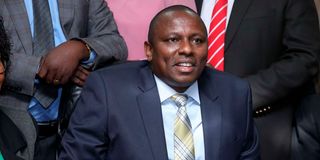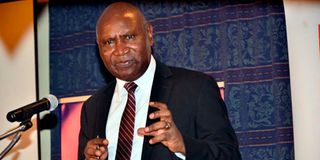Premium
Runaway public debt: Heist or just hot air?
Fresh controversy is swirling over Kenya’s ballooning debt crisis even as President William Ruto prescribes painful tax measures to fund his Sh3.68 trillion debut budget that has been squeezed by debt service costs.
Kenya’s debt stood at a record Sh9.39 trillion in March 2023, but a group of auditors who have forensically combed through the country’s public finance records over the past 10 years argue that the huge debt burden has been accumulated through legal breaches and there is no evidence the loans went to specific development projects.
An independent review team led by Mr Bernard Muchere, an auditor with over 40 years of experience, has poked holes into the legality of trillions of shillings borrowed since the Jubilee administration took office in 2013.
An analysis of published public debt data by the Central Bank of Kenya (CBK) against the authorised public debt by the Appropriation Acts shows that Sh4 trillion taken between 2014 and 2022 was not approved by Parliament.
“Sh4.098 trillion debts were not authorised by the Appropriation Acts; hence, the debts were borrowed outside the public financial management system falling short of being public debt,” states a report following the audit led by Mr Muchere, who has retired after 30 years at The Treasury.
This comprises unauthorised external debts totalling Sh1.1 trillion which cannot be linked to the budgeted projects.

President William Ruto speaking at State House Nairobi on June 19, 2023. He has prescribed painful tax measures to fund his Sh3.68 trillion debut budget that has been squeezed by debt service costs.
The balance is an additional Sh2.9 trillion in domestic debts as per CBK data yet there were no debts authorised under the Appropriation Acts in the same period, it said.
This questionable debt is nearly half of the entire debt stock of Sh9.39 trillion, which comprises Sh4.53 trillion in domestic debt and Sh4.85 trillion in external debt, according to data from the CBK.
7trn borrowed in 9 years
The country’s outstanding debt stood at Sh2.37 trillion as of June 2014, which means Kenya has borrowed Sh7.02 trillion during the nine years alone.
The auditors argue that domestic debt is borrowed without authority and appropriation by Parliament and there are no projects linked to the debt.
They also question amendments to the Public Finance Management Act, 2012 designed to circumvent the constitutional requirement under Article 206 (1) of the Constitution that require all receipts from loan money be paid into the consolidated fund.
In particular, one of the exemptions on funds “disbursed directly to the suppliers where the loan is a government-to-government loan and is raised for the purpose of financing goods and services provided by a supplier outside Kenya” is the subject of a parliamentary petition on the standard gauge railway.
The petition by Busia Senator Okiya Omtatah dated June 22 argues that the over $5 million (Sh712 billion in current exchange rate) loan from Exim Bank was not paid into the consolidated fund as it was portrayed as a government-to-government deal.
Yet “forms of irrevocable notice of drawdowns” substituted for payment of loan into the consolidated fund which, according to the petition, essentially meant SGR was constructed using taxpayers’ money totalling over Sh644 billion in the form of government grants to Kenya Railways.

Busia Senator and activist Okiya Omtatah. A petition by Busia Senator Okiya Omtatah dated June 22 argues that the over $5 million (Sh712 billion in the current exchange rate) loan from Exim Bank was not paid into the consolidated fund as it was portrayed as a government-to-government deal.
The auditors argue that much of Kenya’s debt, especially domestic debt, was borrowed illegally as the domestic borrowing was not authorised by the appropriation acts passed by Parliament over the past eight financial years in breach of the law.
Section 15(2)(c) of the Public Finance Management (PFM) Act 2012 provides that loans borrowed by the National Treasury ought to be used for development expenditure only and not recurrent spending.
Conflict with Constitution
The auditors further say the amendment of the PFM Act of 2012 in 2014 by the Jubilee administration to introduce two exceptions not provided for in the Constitution which allows the loans not to be deposited into the Consolidated Fund is in conflict with the Constitution.
“Domestic debt is borrowed without authority and appropriation by Parliament and there are no projects linked to the debt,” says the report prepared by the auditors led by Mr Muchere, a fraud risk management consultant who is a former president and vice president of the Association of Certified Fraud Examiners Kenya Chapter .
Yesterday, National Assembly Majority Leader Kimani Ichung’wah acknowledged that the previous government did not make full disclosure on what debt would finance what project.
“As budget Chair, the budget committee in all its reports insisted on project-based debt with a specific list of projects to be funded using borrowed funds. The previous regime was conflicted between public good and private interests. Because of this, State capture took over and influenced policy to benefit private interests,” Mr Ichung’wah said.

National Assembly Majority Leader Kimani Ichung’wah. Mr Ichung’wah acknowledged that the previous government did not make full disclosure on what debt would finance what project.
The Kikuyu MP served as the chairman of the Budget committee in the National Assembly in the last Parliament but was ousted during a purge by then-President Uhuru Kenyatta of House leaders allied to his then deputy, William Ruto.
And Treasury CS Njuguna Ndung’u declined to respond to questions, including whether all loans have been put to good use, on scrutiny of the public debt register and what loans are never wired to the Consolidated Fund.
“I would not know the answers to these questions. I left CBK in 2015 March. That is a long time. I did not participate in any loan negotiations except being a fiscal agent on domestic borrowing,” said Prof Ndung’u, who served as Central Bank of Kenya (CBK) governor for two consecutive terms, from March 2007 until March 2015.
CBK Governor Kamau Thugge, who served as Treasury Permanent Secretary between 2013 and 2018, did not also respond to the questions.
Audit not made public
In 2021, Auditor-General Nancy Gathungu launched a comprehensive audit of Kenya’s public debt to establish the accuracy of the Treasury’s then Sh7.7 trillion debt stock and debt servicing activities. The audit, which has not been made public, sought to establish whether transactions were recorded accurately and completely and whether there was a timely payment of the debt to avoid attracting penalties.
Ms Gathungu had raised queries over the accuracy of debt figures, noting that in 2020, some Sh2 billion had been overspent in Treasury bills and a Sh26.2 billion variance in Treasury bonds recorded at the summary statement of public debt and the recomputed closing balance. “The over-redemption of Sh2 billion was not acknowledged by the Central Bank of Kenya and may, therefore, not be recoverable,” Ms Gathungu said.
Former Auditor-General Edward Ouko in 2016 found himself in hot water as he probed how proceeds from the $2 billion Eurobond were used by the Jubilee government.

Former Auditor General Edward Ouko. Dr Ouko in 2016 found himself in hot water as he probed how proceeds from the $2 billion Eurobond were used by the Jubilee government.
Then President Kenyatta scoffed at Dr Ouko who had told Parliament that his office would conduct a forensic audit of the funds outside Kenya after securing appointments with top US and UK financial institutions involved in the transactions.
“When you say that the Eurobond money was stolen and stashed in the Federal Reserve Bank of New York, are you telling me that the Kenyan government and the United States have colluded?” Mr Kenyatta posed.
In 2017, Dr Ouko went on to release a report on the management of public debt in Kenya, seeking to assess institutional strength in the management of debt.
The audit found that the Treasury’s non-establishment of a sinking fund for loan redemption and the office of the registrar of national government securities to maintain a register of government securities may have resulted in poor cash management, lack of transparency, and accountability in the domestic debt market.
Mr John Mutua, programmes coordinator at the Institute of Economic Affairs (IEA), says the civil society has unsuccessfully raised concerns about Treasury’s refusal to publish a comprehensive public debt register, which would be essential to analyse the figures and establish their credibility.
“For every debt that we borrow, we need information on tenure, interest rates, denomination, and other details. Surveys have shown that the information provided does not provide those details,” says Mr Mutua.
Kenya has incurred a steep cost for its domestic debt and paid a total of Sh2.11 trillion in interest on this debt between the financial year 2014/15 and 2021/22.
The Treasury will spend a further Sh553 billion on interest on domestic debt in the current financial year, bringing the total to Sh2.67 trillion.
Interestingly, the government will spend a total of Sh579.21 billion on development expenditure in the ongoing financial year which is almost at par with domestic interest payments, underlining the huge burden of debt on the budget.






